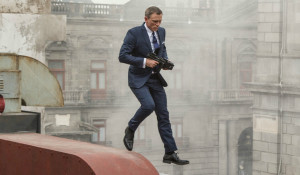When the James Bond series gets it right, it gets it right. Daniel Craig’s “Casino Royale,” and “Skyfall” were engaging, thrilling, and some of the best that the series had to offer all the way from the Connery era to present. However, when it gets it wrong, a disappointing shell of the famous spy finds its way to the big screen. “Quantum of Solace” was such a film, which garnered an undesirable grade from critics (Roger Ebert giving it only 2 stars). And here we have the highly anticipated “Spectre,” reuniting Daniel Craig’s Bond with “American Beauty” director Sam Mendes. Unfortunately, while not as unsatisfying as “Quantum of Solace,” “Spectre” fails to live up to the large boots filled by “Skyfall” and falls markedly short of the experience many were hoping for.
All of the usual players are here (except for Judi Dench, of course, who left the Bond films in “Skyfall,” replaced by Ralph Fiennes as ‘M’). We have Craig reprising his role once again (although Craig claims in an interview for it to be his last time), Fiennes, Ben Wishaw (as the innovative ‘Q’), and the film also brings some new players to the mix as well. Christopher Waltz appears as the villainous Blofeld, and the enchanting Léa Seydoux as new Bond girl Madeleine Swann. Q in particular really shines as the MI6 quartermaster, channeling more and more the humor of Desmond Llewelyn in films such as “GoldenEye” or “Tomorrow Never Dies.” “I said to bring it back in one piece, 007, not bring back one piece” he muses of a ruined car in one hysterical scene.
As with most of the Bond films, “Spectre” chooses a host of locations for its action, which are represented once again in exquisite detail. From shootouts amidst high-topped buildings, to a helicopter fight hovering over crowded Zócalo Square in Mexico, the opening of “Spectre” certainly makes its entrance known. And the cinematography by Hoyte Van Hoytema (responsible for shooting films like the amazing “Her” and Christopher Nolan’s “Interstellar”) is spectacular. Mexico City is shown in both the old and the new, as shining skyscrapers surround its historic square. As the film progresses, the camera also helps create the pallor of the film: London is here contrasted in dark hues, not at all the bright greys used in “Skyfall,” which aligns with “Spectre’s” tone. If the former was about Bond’s roots and a new age, this film is dark, murky, and as uncertain as the fate of MI6 itself.

The acting is rather pleasing across the board, though the film drops the ball in the intricate character development that made “Skyfall” such as success. The burgeoning relationship and camaraderie between Bond and Moneypenny started in the previous film is all but abandoned here, and in fact is limited to only one scene. Likewise, Ralph Fiennes, who is a splendid actor as evidenced by the award-winning “Schindler’s List” is wasted here, constrained by a script that wants him to be rational and by-the-numbers, even when the situation calls for the opposite. There were several opportunities during “Spectre” for Fiennes to shine as ‘M,’ as Judi Dench had before. Alas, this is never explored.
While “Spectre” is purported to be Craig’s last foray as 007, he doesn’t make many missteps here, and once again brings that bravado/tortured elegance that makes his version of James Bond such an enigma. He’s pitted in this film against its new villain, Blofeld, but really the villain in the film becomes SPECTRE, the organization behind several of Bond’s previous terrorists and adversaries. The plot offered in the film is complex, and I will not attempt to even hint at SPECTRE’s scope, but in its unveiling becomes an exercise in mere plot advancement rather than believability. In this lies my biggest criticism of the film. “Spectre” had a lot to offer; but by over-explaining its’ villain’s actions, while simultaneously under-explaining his motives, the film becomes more formulaic and less exciting that it could have been. Bond vs. LeCiffre in “Casino Royale” made sense, as did Bond vs. Silva in “Skyfall.” But Bond vs. Blofeld does not, and it’s an unfortunate slight “Spectre” never really overcomes.
– by Mark Ziobro